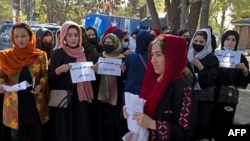"Every girl deserves to live in a world free from gender-based violence and discrimination, where she has access to quality education, health care, and future employment opportunities,” said U.S. Ambassador to the United Nations Linda Thomas Greenfield.
Indeed, these are the human rights of every girl. Ensuring these rights are protected is crucial to ending extreme poverty and increasing the shared prosperity of any society or country.
Investment in girls’ education benefits not only the individual girls, but also their communities. According to the World Bank, girls with secondary education grow into women who are better informed about nutrition and healthcare. They are less likely to marry before the age of 18, and they have fewer children. They are also more likely to work outside of the home and earn higher incomes. As a result, they have healthier, better educated kids who themselves have well-educated, healthy children.
Nonetheless, in too many countries, girls face barriers to completing their education. The World Bank warns that societies which prevent girls from completing 12 years of education, lose between $15 and $30 trillion in lifetime productivity and earnings.
It is important to note that the obstacles girls face directly impact their ability to learn and perform at their best. First, girls often feel unsafe while in school and while traveling to and from school. Gender-based violence is one of the reasons they may not finish their education. Gender bias in the classroom is another challenge. Gender stereotypes have a long-term negative impact on girls’ self-esteem and academic performance, as well as their choice of field of study. Girls must be given the opportunity to complete all levels of education, and to learn the skills necessary to compete in the labor market. They must be allowed to make decisions about their own lives, and to contribute to their communities and countries.
“The United States remains committed to promoting and protecting the human rights of all girls and young women,” said Ambassador Thomas Greenfield. “We call on the world to partner with us to ensure that girls have access to safe food and water, to an education, to medical care and vaccines, and to a future free of violence where their human rights are respected,” she said.
“We know that when girls are able to be free and full participants in global conversations, we are all better for it.”





